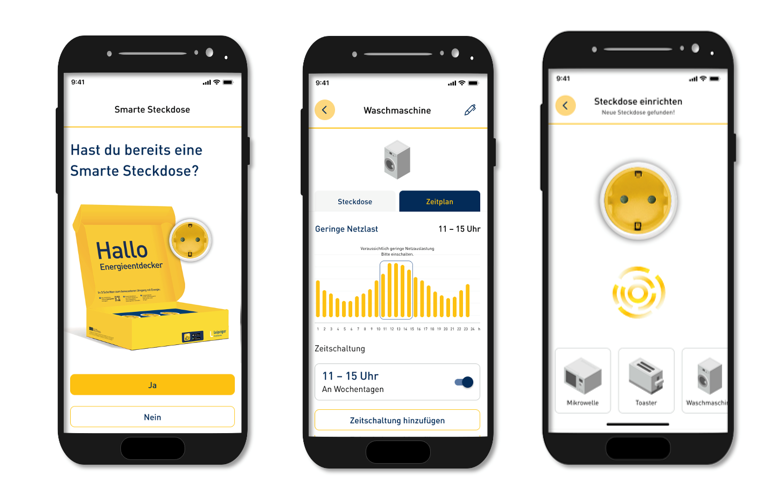How can we encourage end consumers to be more aware of their energy consumption? This is what Leipziger Stadtwerke is investigating as part of the SPARCS sub-project for developing virtual energy communities. The so-called „smart socket“ plays a central role in this. In this work package, Leipziger Stadtwerke has designed and implemented an app that does three things: it sensitises its users to their own consumption behaviour, provides concrete incentives to save electricity and, last but not least, it influences power flows in a targeted manner. We already have the first findings from practice.
The application, consisting of a smart socket and its associated app, is the first part of the multi-stage LeipzigZERO programme, with which Leipziger Stadtwerke wants to work together with tenants to develop a forward-thinking awareness of energy in the long term. As part of the SPARCS research project, Leipziger Stadtwerke developed the concept and the app.
It is a socket with digital, remotely readable consumption data recording, which can also be used to control consumption in a targeted manner. To do this, the SPARCS project team is working with estimated prospective load profiles, complemented by defined control messages in which scenarios the power flow of a smart socket is to be interrupted. Here, the Stadtwerke then sends requests to the user via the app to find out whether their devices connected with the sockets can be switched off at certain times. The user can switch off the power at these sockets manually, and the process can also be automated by the Stadtwerke.
The aim is, on the one hand, to make users aware of their consumption behaviour in the long term. This is because smart consumption control allows them to have more transparency. The users also receive tips for saving energy, and learn more about intelligent power consumption. The app has a gamification approach to encourage the users to save energy. In this way, saving electricity is transformed into a playful challenge. On the other hand, the application can contribute to levelling the power flows in the grid by mitigating consumption peaks. In this way, the consumption of power from fossil sources and thus our CO2 emissions are kept as low as possible.
The project is currently in the trial phase. This has a multi-layer structure so that the circle of users can be expanded gradually over the next two years: at the moment, practical tests are being carried out within the SPARCS project team. In the next stage, employees at the Leipziger Stadtwerke will be given the opportunity to try out the application. The stage after that covers the roll-out to the SPARCS project district, the Duncker district. In the final test phase, other existing customers of the Leipziger Stadtwerke in the city region will be included. In total, 333 residential units should each receive a starter package which includes three smart sockets and access to the app. A period of use of two years is planned. During this period, the consumption data is collected monthly and evaluated with regard to the possible CO2 savings. The final evaluation of the collected data will then take place in autumn 2024.
The primary knowledge interest here is user behaviour. How do they interact with the smart socket? How do they react to the incentives to save energy? Does their consumption behaviour actually change, does this mean that the concept works? From the outset, it is evident that the concrete energy saving potential is currently negligible. In order to have a greater effect, significantly more users must be connected – and not merely private households, also commercial customers and charging stations for electric vehicles, for instance. Using the smart socket becomes more and more worthwhile depending on the number of high-consumption devices connected, for example, large household appliances such as electric ovens, fridges, washing machines and dishwashers. The measured results currently still need to be scaled in order to make forecasts on the possible effects.
At the moment, the current tested version of the app still works without gamification, as there still needs to be some coordination with the participating external partners. It will only be used as of the roll-out in the Duncker district as a special tool to keep customers interested and motivated. Up until then, the SPARCS project team is using the gathered practical experience to perfect the technical side of the app as part of an iterative process.
Irrespective of the above, the topic of energy awareness plays a key role in the communication of Leipziger Stadtwerke. Because the primary goal is clear: in order to turn Leipzig into a sustainable and future-proof city and drive forward the energy transition in the city and region, the top priority must be to reduce the consumption of energy from fossil sources. The smart socket with the app developed as part of the SPARCS project can be an important building block for this objective – if the outcome of the test phase is positive, this offer might make its way into the product range of Leipziger Stadtwerke as a permanent feature.
Author: Leipziger Stadtwerke

